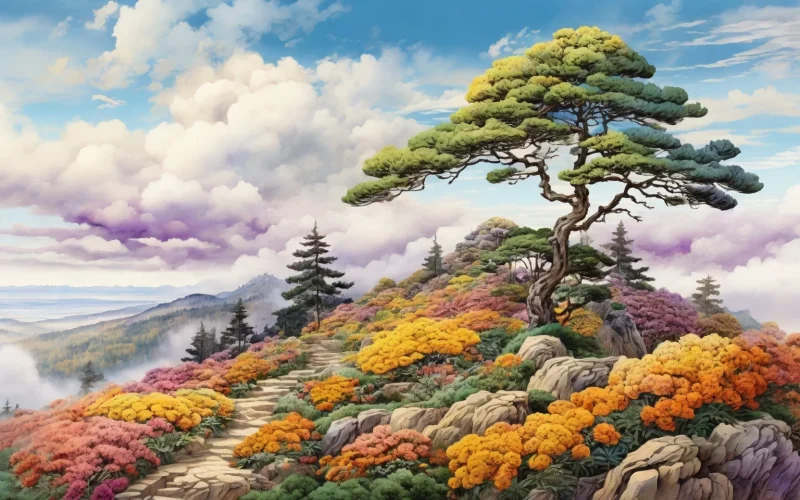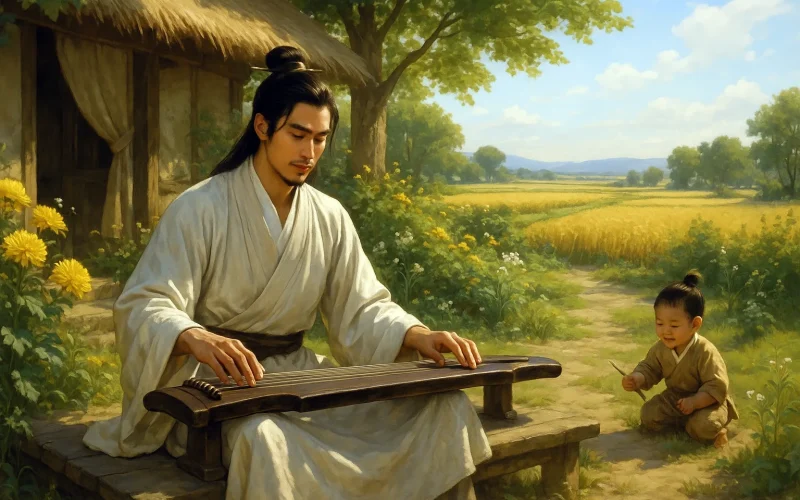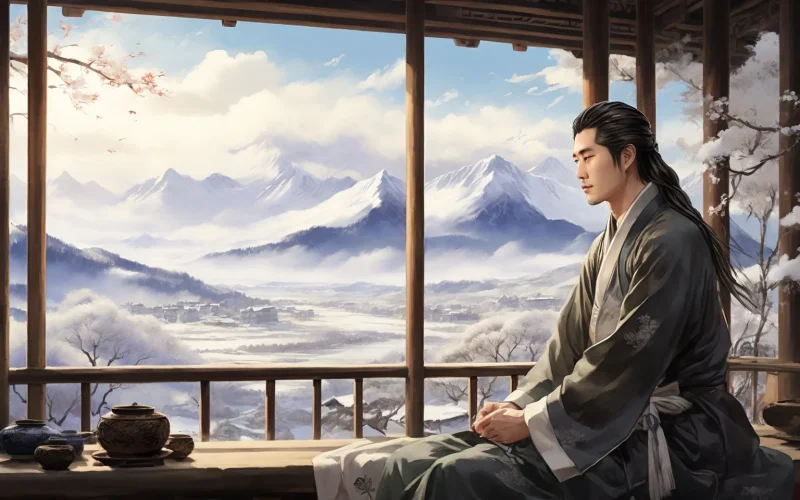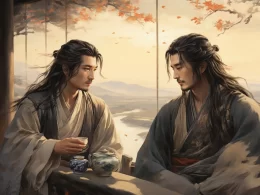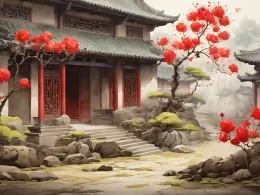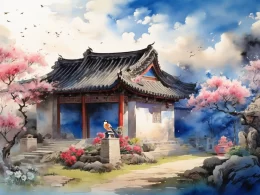Three spring moons abound in mild rain;
Now come the cool, pure autumn days.
No mist floats over dewy plain;
The sky sublime sheds limpid rays.
Peaks tower, mountains undulate,
What a wonderful far-off sight!
Chrysanthemums are golden mate
Of green pines crowning rocky height.
On their spirit I meditate:
Frost-proof, they are so brave and bright.
Cup in hand, I miss the recluse
Who loved blooms and pines long ago.
What have I done?
What could I choose?
I can only bend my head low.
Original Poem
「和郭主簿二首 · 其二」
陶渊明
和泽周三春,清凉素秋节。
露凝无游氛,天高肃景澈。
陵岑耸逸峰,遥瞻皆奇绝。
芳菊开林耀,青松冠岩列。
怀此贞秀姿,卓为霜下杰。
衔觞念幽人,千载抚尔诀。
检素不获展,厌厌竟良月。
Interpretation
Written during Tao Yuanming's reclusive years, this autumn meditation reveals the poet's complex inner world - though freed from official constraints, his spirit remains unsettled by unfulfilled ideals. Through crisp autumn scenery and resilient flora, he expresses steadfast integrity amid worldly disappointments.
First Couplet: "和泽周三春,清凉素秋节。"
Hé zé zhōu sān chūn, qīngliáng sù qiū jié.
Gentle rains nourished three spring months; now comes crisp autumn's pure season.
The seasonal contrast highlights autumn's austere clarity, establishing the poem's elevated tone.
Second Couplet: "露凝无游氛,天高肃景澈。"
Lù níng wú yóu fēn, tiān gāo sù jǐng chè.
Dew condenses - no stray mists; sky vaults high - vistas crystalline.
This quintessential autumn scene embodies nature's transcendent serenity.
Third Couplet: "陵岑耸逸峰,遥瞻皆奇绝。"
Líng cén sǒng yì fēng, yáo zhān jiē qí jué.
Ridges raise extraordinary peaks, distantly glimpsed in wondrous array.
The majestic peaks symbolize lofty individuals, reflecting the poet's admiration for transcendent figures.
Fourth Couplet: "芳菊开林耀,青松冠岩列。"
Fāng jú kāi lín yào, qīng sōng guān yán liè.
Fragrant chrysanthemums blaze through woods; pines crown cliffs like ranked coronets.
Chrysanthemums (defying frost) and pines (evergreen) become emblems of unyielding virtue.
Fifth Couplet: "怀此贞秀姿,卓为霜下杰。"
Huái cǐ zhēn xiù zī, zhuó wéi shuāng xià jié.
Cherishing these steadfast forms, peerless heroes beneath the frost.
The natural specimens are celebrated as winter-defying champions, metaphorizing human excellence.
Sixth Couplet: "衔觞念幽人,千载抚尔诀。"
Xián shāng niàn yōu rén, qiān zǎi fǔ ěr jué.
Wine cup in hand, I ponder recluses - across millennia, caressing your legacy.
The poet bridges centuries through shared cups with ancient kindred spirits.
Seventh Couplet: "检素不获展,厌厌竟良月。"
Jiǎn sù bù huò zhǎn, yàn yàn jìng liáng yuè.
My simple worth finds no expression; listless even in this radiant moon.
A candid revelation of frustration - virtuous restraint yields worldly disappointment, casting shadows even during luminous nights.
Holistic Appreciation
This autumn masterpiece intertwines scene and sentiment through symbolic natural imagery. The "pure autumn" backdrop frames a landscape of crystalline clarity and moral resilience. Pines, chrysanthemums and mountain peaks transcend physicality to represent spiritual ideals and reclusive nobility. While lines like "no expression" and "listless" confess disappointment, they ultimately underscore the poet's quiet fortitude - a recluse physically but never spiritually resigned, maintaining profound inner landscapes beneath surface calm.
Artistic Merits
- Symbolic richness: Natural elements embody human virtues
- Structural balance: Scenic description progresses to philosophical expression
- Emotional complexity: Surface tranquility conceals deep yearning
- Historical resonance: Connects present contemplation with eternal values
Insights
The poem teaches that integrity often blooms brightest in life's autumn seasons. Tao demonstrates how nature's steadfast elements (pines enduring winter, chrysanthemums blooming defiantly) mirror human capacity for dignified perseverance. His example suggests that true fulfillment comes not from external validation but from aligning one's life with enduring principles - a lesson resonating across centuries for all who value inner truth over worldly success. The work ultimately affirms that spiritual nobility transcends temporal disappointments.
Poem translator
Xu Yuanchong (许渊冲)
About the poet

Tao Yuanming(陶渊明), 365 – 427 CE, was a poet, literary figure, fu writer, and essayist active during the late Eastern Jin and early Liu Song dynasties. Born in Chaisang (near present-day Jiujiang, Jiangxi Province), he pioneered a new genre of pastoral-themed literature, expressing profound philosophical insights through simple language. His poetic style became an enduring aesthetic standard in classical Chinese poetry.






